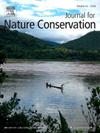扩大基于自然的解决方案,促进湿地的粮食安全和气候适应能力:类型学、障碍和机遇
IF 2.5
3区 环境科学与生态学
Q2 BIODIVERSITY CONSERVATION
引用次数: 0
摘要
生态系统和土地退化、生物多样性丧失以及粮食安全是当今的重大挑战,特别是在发展中国家。气候变化加剧了这些风险,影响了农业系统、湿地和粮食安全。基于自然的解决方案(NbS)通过保护、管理和恢复森林、农业、湿地和沿海地区的生态系统,帮助缓解这些挑战;因此,它们的广泛采用对未来的粮食安全和抵御能力至关重要。为了更广泛地扩大规模,对国家统计局概念及其扩大的障碍和机会有一个基本的了解是至关重要的。然而,对不同行业的国家统计局和国家统计局类型的障碍和机会的系统记录做得很差。现有的信息很少而且分散,特别是关于湿地的信息。本研究采用系统评价和荟萃分析的首选报告项目(Preferred Reporting Items for systematic review and meta - analysis, PRISMA)方法对相关文献进行了系统回顾和分析,分析了国家统计局在增强湿地生态系统恢复力方面的作用,确定了采用国家统计局的障碍和机会,提出了扩大国家统计局规模的建议,并提出了不同部门和主题的国家统计局类型。研究表明,意识不强、知识差距、技术犹豫、生态和地理挑战、制度和政策障碍以及财政约束等障碍阻碍了国家统计局的广泛采用。解决这些障碍的机会包括定制技术、强有力的政策框架、增加资金以及由跨部门合作努力和传统知识支持的能力建设。政策改革和多样化的融资机制对于扩大国家统计局规模至关重要,最终将增强粮食安全、环境可持续性和气候适应能力。类型学分为基于生态系统、基于气候、基于社会经济和基于目标。这是对该领域的重要贡献,也是在不同社会经济和环境背景下扩大国家统计局规模的战略路线图,最终将加速其采用并促进可持续性。本文章由计算机程序翻译,如有差异,请以英文原文为准。
Scaling up nature-based solutions for food security and climate resilience in wetlands: typologies, barriers and opportunities
Ecosystem and land degradation, biodiversity loss, and food security are critical challenges today, especially in developing countries. Climate change exacerbates these risks, impacting agricultural systems, wetlands, and food security. Nature-based Solutions (NbS) help mitigate these challenges by protecting, managing, and restoring ecosystems across forests, agriculture, wetlands, and coastal areas; therefore, their widespread adoption is crucial for future food security and resilience. For wider scaling up, a basic understanding of the NbS concept, along with its barriers and opportunities for scaling up, is critical. However, systematic documentation of barriers and opportunities of NbS and NbS typologies for different sectors is poorly done. Existing information is scanty and scattered, particularly for wetlands. Through a systematic review and analysis of relevant literature using the Preferred Reporting Items for Systematic Reviews and Meta-Analyses (PRISMA) method, this study analyzes NbS for enhancing resilience in wetland ecosystems, identifies barriers and opportunities for adoption of NbS, provides recommendations for their scaling up, and suggests NbS typologies for different sectors and themes. It revealed that barriers such as poor awareness, knowledge gaps, technological hesitancy, ecological and geographic challenges, institutional and policy obstacles, and financial constraints hinder the widespread adoption of NbS. Opportunities to address these barriers include customized technologies, robust policy frameworks, increased funding, and capacity building supported by collaborative efforts across sectors and traditional knowledge. Policy reforms and diverse financing mechanisms are crucial for scaling up NbS, ultimately enhancing food security, environmental sustainability, and climate resilience. The typologies are grouped in ecosystem-based, climate-based, socioeconomy-based, and objective-based. It is an important contribution to the field and a strategic roadmap for scaling up NbS in different socio-economic and environmental settings, ultimately accelerating their adoption and promoting sustainability.
求助全文
通过发布文献求助,成功后即可免费获取论文全文。
去求助
来源期刊

Journal for Nature Conservation
环境科学-生态学
CiteScore
3.70
自引率
5.00%
发文量
151
审稿时长
7.9 weeks
期刊介绍:
The Journal for Nature Conservation addresses concepts, methods and techniques for nature conservation. This international and interdisciplinary journal encourages collaboration between scientists and practitioners, including the integration of biodiversity issues with social and economic concepts. Therefore, conceptual, technical and methodological papers, as well as reviews, research papers, and short communications are welcomed from a wide range of disciplines, including theoretical ecology, landscape ecology, restoration ecology, ecological modelling, and others, provided that there is a clear connection and immediate relevance to nature conservation.
Manuscripts without any immediate conservation context, such as inventories, distribution modelling, genetic studies, animal behaviour, plant physiology, will not be considered for this journal; though such data may be useful for conservationists and managers in the future, this is outside of the current scope of the journal.
 求助内容:
求助内容: 应助结果提醒方式:
应助结果提醒方式:


